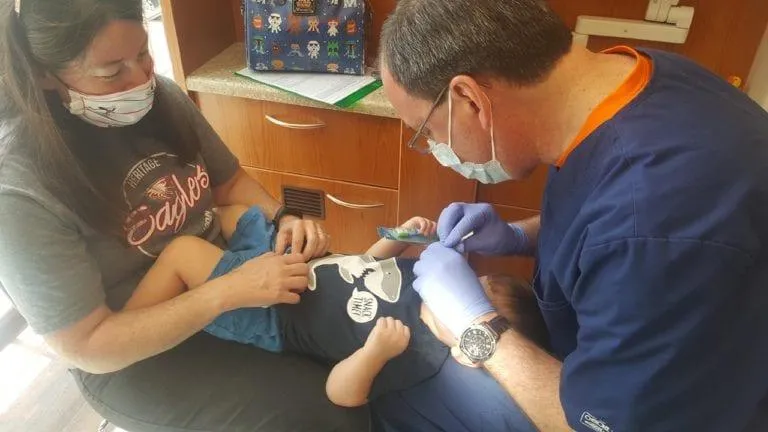WELCOME TO
HURST PEDIATRIC DENTISTRY!
Here at the pediatric dental office of Dr. Joby Hurst, we take pride in offering our young patients the highest quality of dental care in a kid-friendly environment. We are conveniently located in Birmingham, Alabama and are experienced in providing routine dental care for infants, children, teens and patients with special needs.
Dr. Hurst and his team of friendly professionals work together to provide a positive dental experience that will make your child smile! We promise to work with you and your child personally and create a customized treatment plan to meet your individual needs and desires.
Office tour
Early Dental Care
We believe early dental care can promote a lifetime of healthy smiles for your child. We offer a full range of services from routine dental exams and cleanings to fillings, sealants and fluoride treatments that will help ensure that your child grows up with a healthy smile.
Sedation Dentistry
We recognize that for some of our patients, a visit to the dentist makes them a bit nervous.
We offer nitrous oxide sedation for our more apprehensive patients, so they can relax while receiving the dental care that they need.
For those requiring more intensive treatment, Dr. Hurst offers in office anesthesia using Dr. Jeff Plagenhoef.
Dr. Jeff is a board-certified pediatric anesthesiologist with Pediatric Dental Anesthesia Associates.
We appreciate your interest in our practice and encourage you to continue exploring our website to learn more about us. Feel free to contact us to schedule an appointment with Dr. Joby Hurst today!

Blogs and Resources

Unlocking Smiles: Benefits of Special Needs Dentistry
Dentistry for special needs patients is an important yet sometimes overlooked aspect of dental care. Special needs dentistry can provide greater access to dental care for those with special needs as well as improve the quality of care they receive.
In this blog post, we will explore the benefits of special dentistry and the common types of sedation dentistry for special needs patients. We will also discuss early dental care for children with special needs and the importance of dental fillings, crowns, and root canals.
By the end of this post, you will have a better understanding of how special needs dentistry can benefit those in need of accommodation.
Understanding the Benefits of Special Needs Dentistry
When it comes to caring for special needs patients in dentistry, unique considerations must be taken into account. Special needs dentistry provides tailored dental care for individuals with disabilities and special needs, offering a safe and secure environment for those who may be uncomfortable or anxious in a traditional dental office. Understanding the importance of maintaining dental health for special needs children and how dentists can cater to their unique needs ensures access to quality dental care for those patients.
Special needs dentists are specially trained to address the unique dental issues that accompany disabilities and special needs. They utilize various techniques and technologies, such as modified instruments, specialized chairs, and sedation dentistry, to provide quality care.
Behavior management techniques may also be employed to help children feel comfortable during dental visits. Additionally, extra precautions should be taken when treating special needs patients due to their medical conditions that could complicate treatment plans or procedures.
Sedation or anesthesia may be necessary for the treatment of some special needs patients. There are three types of sedation, each of which has its own benefits depending on the individual's condition.
Consulting with a dentist prior to making decisions about sedation options for a child's treatment plan is important. It is also essential to discuss effective ways to promote oral hygiene at home, as it is a crucial component of proper dental care for individuals, especially those with special needs.
Special needs dentistry aims to provide personalized care so that patients can maintain good oral health, leading to improved overall health and well-being for individuals with disabilities and special needs. With the right resources and care from a qualified special needs dentist, you can ensure that your child is receiving the best possible treatment available.

Common Types of Sedation Dentistry for Special Needs Patients
Special needs dentistry is a growing field that focuses on providing care for individuals with special needs. It is crucial for these patients to have access to high-quality dental care, and sedation dentistry can make that possible. Sedation reduces anxiety and fear in special needs patients, enabling them to receive comprehensive dental care.
Sedation dentistry is an effective tool for providing dental care to special needs patients. It involves administering medications or gases before or during treatment to relax the patient and reduce stress and anxiety associated with dental visits. Oral conscious sedation is also available for children who need extra help calming down during their visit, such as those with autism spectrum disorder (ASD).
Sedation dentistry not only improves access to dental care but also helps lessen anxiety during procedures. Special needs patients often struggle with even routine treatments such as teeth cleanings or fillings.
Sedation provides a relaxed environment where patients feel safe and secure, making these treatments more comfortable. Common types of sedation used in this dental work include:
nitrous oxide — laughing gas
oral conscious sedation — medication by mouth prior to treatment
general anesthesia — intravenously administered medication
Special needs dentistry offers other benefits as well. It allows for earlier identification of complex problems, tailors treatment plans to unique needs, advocates for patient-oriented care, and educates individuals on oral health issues specific to disabilities or behavioral disorders.
This specialized care improves the quality of life for those with physical or mental disabilities by providing proper dental treatment without fear or anxiety associated with traditional methods in a dental office.
Sedation dentistry is an invaluable tool for providing comprehensive dental care in a safe and controlled environment for special needs patients, reducing the risk of physical and mental injury during the process. This method of treatment is becoming increasingly popular among individuals who require specialized attention, potentially revolutionizing the way we approach oral health.

How Sedation Can Improve Access to Dental Care for Special Needs Patients
For individuals with special needs, accessing dental care can be challenging. Fortunately, sedation dentistry offers a solution that can improve access to necessary treatments and create a safe and comfortable environment for the patient. In this section, we will discuss the benefits of special needs dentistry and how sedation techniques can help improve access.
Having access to specialized care through a child-friendly dentist who understands the unique challenges faced by individuals with special needs is an important part of successful treatment. With sedation dentistry, it is easier for these patients to receive necessary treatments like early dental cleanings, fillings, crowns, root canals, and extractions without feeling anxious or overwhelmed.
It also helps reduce distractions, allowing more time to be spent on treating the patient instead of having them deal with fear or discomfort caused by traditional methods of providing care solely through verbal instructions.
It is important to note that there are risks associated with undergoing any type of sedation dentistry procedure; however, these risks are usually minimal compared to those posed by traditional methods used on special needs patients who may not understand what is happening during their visit due to communication difficulties or sensory issues common among individuals on the autism spectrum.
The cost implications should also be taken into account when considering whether it is worth using this type of technique, but rest assured that most insurance plans will cover some portion of it if you have one in place!
Despite any risk or cost factors, sedation dentistry has many potential benefits for individuals with special needs seeking important dental care services. It can:
reduce anxiety and fear associated with visiting the dentist's office,
create a safe environment conducive to successful treatments,
decrease the overall amount of time needed from start to finish, and
make complex procedures like root canals easier, all while improving access overall.
If you are looking into getting specialized treatment for your loved ones struggling within traditional dental office settings, consider opting for child-friendly services that utilize specialized tools and techniques.

Early Dental Care For Children With Special Needs
For children with special needs, early dental care is essential to prevent more serious issues in the future. Special needs dentists understand the unique challenges faced by these patients and provide tailored care to meet their needs.
Establishing a long-term relationship between dentist and patient is key to providing dental care for special needs patients. This creates trust and ensures the patient feels comfortable during visits. Properly trained staff members promote comfort during procedures and identify triggers that may cause anxiety or distress.
Preventative oral health practices are essential for treating special needs patients, including regular dental cleanings, sealants, fluoride varnish applications, and fillings if necessary. Regular early intervention reduces infection and disease while maintaining healthy teeth and gums and improving self-confidence.
Overall, special needs dentistry increases oral health and well-being among those with disabilities or other conditions that make them more susceptible to oral health issues, which can improve their overall quality of life.
With appropriate care provided by specialists who understand their unique needs, children with special requirements can benefit greatly from proper dental care.
Understanding Special Needs Dental Care for Children
When it comes to dental care for children with special needs, it is important to understand the care children receive. Special needs dentistry offers a safer and easier experience for the child being treated and understands the unique needs of special needs patients. It provides access to specialized methods and techniques that may not be available in general dentistry, as well as age-appropriate evaluation and treatment practices.

Services such as extra time in the chair, hands-on guidance during treatment, etc., all of which can help reduce fear and anxiety related to dental visits, allows children with special needs to receive the same quality of dental care as other kids, making it easier for parents/caregivers when taking their child for regular checkups.
In addition, special needs dentists have received extra training in complex combination treatments, so they can provide a unique approach to patient care and communication. The credentials needed for a dentist to treat special needs dental patients vary depending on the specific needs of the patient. However, some common credentials include:
A dental degree from an accredited dental school
A license to practice dentistry in the state where the dentist will be practicing
Specialized training in special needs dentistry
Experience working with special needs patients
In addition to these credentials, the dentist should also have a good understanding of the medical conditions that may affect the patient's dental care. They should also be able to work effectively with the patient's caregivers and other healthcare providers.
Some organizations that offer specialized training in special needs dentistry include:
The American Academy of Pediatric Dentistry (AAPD)
The American Dental Association (ADA)
The American Association of Public Health Dentistry (AAPHD)
The AAPD offers a Certificate of Added Qualification (CAQ) in Special Needs Dentistry. The CAQ is a voluntary credential that demonstrates the dentist's specialized knowledge and skills in providing dental care to special needs patients.
The ADA and AAPHD also offer a number of resources for dentists who are interested in providing care to special needs patients. These resources include:
Websites on special needs dentistry
Special Needs Dentistry Toolkits
Special Needs Dentistry Continuing Education Courses
It is important to note that there is no single set of credentials that all dentists who treat special needs patients must have. The specific credentials that are required will vary depending on the needs of the patient and the dentist's practice. However, the credentials listed above are a good starting point for dentists who are interested in providing care to special needs patients.

Optimizing Appointments for Special Needs Patients
Before treating a special needs patient, the dental team needs to create a comprehensive picture of their individual needs. This involves a detailed medical history to identify any potential complications. A complete, accurate and current medical history is crucial to understand any potential interactions with dental procedures.
They should also understand the nature of the disability and the patient's level of independence. Having details on the disability will help the dental team plan for a better patient experience.
Past dental experiences, social background, and communication abilities (including vision, hearing, and cognitive aspects) are all important factors. Understanding the patient's past dental experiences can help the team anticipate any anxieties or challenges.
Additionally, the team should assess sensory sensitivities to light, sound, or touch to create a comfortable environment. Physical limitations in mobility or mouth opening need to be considered as well.
Finally, understanding the patient's home care support system is crucial. If needed, the team can train caregivers on proper brushing and flossing techniques. Also, knowing preferred appointment times and if the patient would benefit from seeing a family member being treated beforehand can improve the experience.
By gathering all this information through a patient assessment form, the dental team can develop a personalized treatment plan with necessary accommodations, ensuring a successful and positive dental visit for the patient.
Conclusion
Special needs dentistry is an essential part of delivering comprehensive care for individuals with physical or mental disabilities. It employs diverse techniques and technologies to guarantee quality care and enable access to dental services.
Sedation dentistry serves as a valuable tool in alleviating anxiety among special needs patients during dental visits, while early dental care establishes the groundwork for excellent oral health in the future. By utilizing these tools and strategies, we can guarantee inclusive access to top-notch dental care for individuals, despite their abilities or disabilities.
Here at Hurst Pediatric Dentistry, Dr. Joby Hurst has specialized training for working with kids who may need a little extra attention to receive dental care. Call us for more information and to book an appointment at (205) 969-7454.

19 INVERNESS CENTER PARKWAY, STE 250, BIRMINGHAM, AL 35242
TEL: 205.969.7454
E-MAIL: [email protected]
2018 © ALL RIGHTS RESERVED | PRIVACY POLICY | TERMS AND CONDITIONS
Site by Trustway Marketing Powered by Kyrios Systems